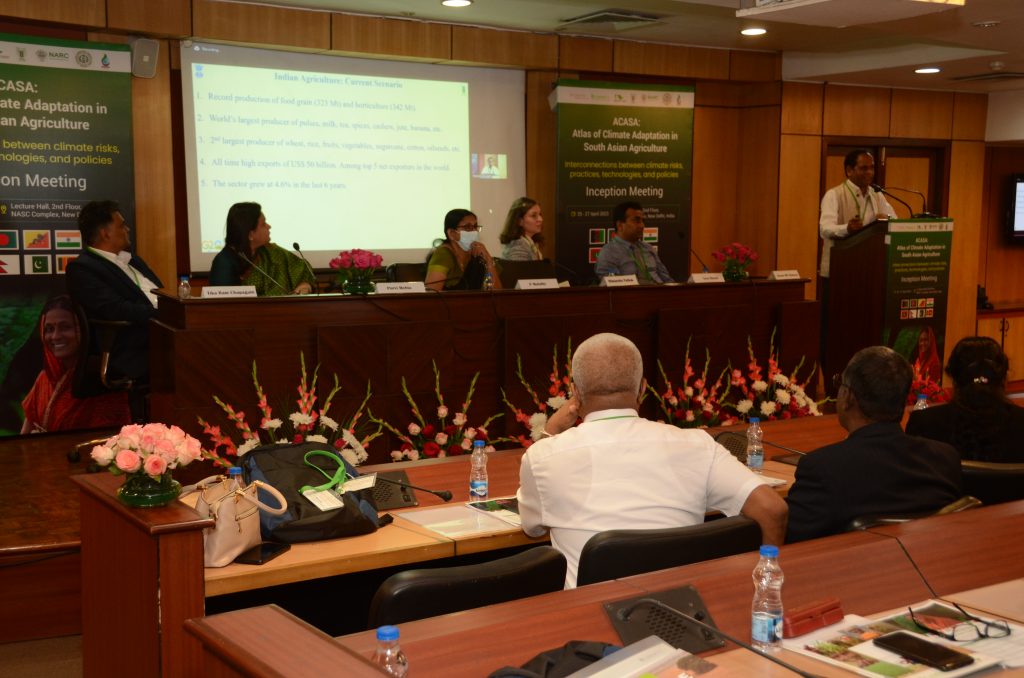South Asia to Get its First Climate Adaptation Atlas in Agriculture
BISA-CIMMYT in collaboration with NARS to develop its first Atlas of Climate Adaptation in South Asian Agriculture
By Richa Sharma Puri & Riya Gupta

April 25, 2023, New Delhi: South Asia has diverse climatic zones given its vast physical landscape. However, the region constantly displays the impact of climate change, where the melting of the glaciers, rising sea levels, soil erosion, water intrusion, and forest fires are worsening the overall situation. These global climatic changes are intensifying the stresses on the most marginalized communities living in South Asia, who are dependent on agriculture, forestry, and fishing for their everyday needs.
Considering this, the Borlaug Institute for South Asia (BISA) organised an inception meeting to develop an Atlas of Climate Adaptation in South Asian Agriculture (ACASA) in collaboration with the National Agricultural Research System (NARS) of the region. It aims at improving access to climate risk and solution option analytics for South Asian countries. To discuss ACASA, a 3-day inception meeting was held in Delhi, marked by 70 distinguished guests from Nepal, Sri Lanka, Bangladesh, and India discussing the various aspects of Atlas.
The inaugural session featured remarks from Dr. Arun Kumar Joshi, Managing Director, CIMMYT-BISA; Dr. Pramod Aggarwal, Regional Program Leader, CIMMYT-BISA and ACASA Leader; Dr. Purvi Mehta, Director, BMGF; Dr. Tess Russo, Senior Program Officer, BMGF; Dr. Hasan Md. Hamidur Rahman, Director, Bangladesh Agricultural Research Council (BARC); Dr. Tika Ram Chapagain, Director, Nepal Agricultural Research Council (NARC); Dr. P Malathy, DG-Agriculture, Sri Lanka; and Dr. Himanshu Pathak, Secretary-DARE and DG Indian Council of Agricultural Research (ICAR), India.
Noting the significance of ACASA, Dr. Pramod Aggarwal, Regional Program Leader, BISA, and ACASA Leader said, “In the face of climate change, countries should pay attention to adaptation policies, and ACASA, when completed in 2025, will provide essential tools to governments, donors, and entities to prioritise investments and enhance the resilience of vulnerable communities to climatic risks”.
Noting the multidimensional nature of ACASA, Dr. Purvi Mehta, Director, BMGF, said, “As South Asia hosts 43% of the world’s farmers, most of its food production is dependent on rainfed agriculture. Research shows climate change entails risks for both farmers and agricultural productivity. Aspects such as food production, food quality, and the income of farmers will all have a significant impact on enhancing productivity. The adaptation of Atlas is hence pivotal in keeping ecological and economic aspects in place”.
Also added Dr. Tess Russo, Senior Program Officer, BMGF: “Solutions must be robust to mitigate climate change hazards. Through the involvement of NARS, we will have better access to data, and as users, we can address what of the problem. Scientists and researchers will further investigate how to address these problems. Thus, ACASA is all of yours, and we will start building it together”.
Looking at de-risking agriculture from the impact of climate change, Dr. Himanshu Pathak, Secretary-DARE and DG Indian Council of Agricultural Research (ICAR), India, said, “The Indian market has taken a lot of initiatives, such as climate resilient crop varieties with promising resilient technologies, which have led to increased agricultural productivity of 3–127 times to this end. However, we are still losing yield and livelihoods, the risks are aggravating, and we need more sophisticated technological interventions. ACASA is a welcome step in that direction. A risk and adaptation Atlas would be particularly useful. ICAR is committed to deploying a team of young scientists to implement Atlas at the national level”.
“As a repository of knowledge and best practices, the Atlas is a collaborative effort mitigate the effects of climate change on agriculture”, added further Dr. Hasan Md. Hamidur Rahman, Director, BARC.
From Sri Lanka, Dr. P Malathy, DG-Agriculture, also added “Understanding the spatial and temporal dimensions of climate change would need an evidence-based solution such as ACASA “.
“To tackle global warming, the government of Nepal is implementing various climate change programmes. A common approach like ACASA could be rewarding for the region and country” added Dr. Tika Ram Chapagain, Director, NARC.
Broadly, the cohort at ACASA pondered on the available tools, data, climate hazards and their impacts and adaptation options that can mitigate the negative impacts. The Atlas also proposed to focus on several use cases such as by governments and NGOs in investment prioritisation, insurance industry for business opportunities and food supply sector for ensuring risk free supply chains. In the end, teams at BISA came out with country-specific work plans with detailed activities, timelines, deliverables, and agreed methodology.